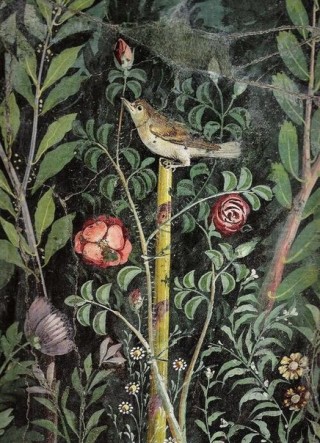In Italy, the nightingale returns in mid-March and leaves in September. His song, melodious and powerful, presents a remarkable variety of modulations and phrasings, by able songwriter, so that one can speak of a personal repertoire different from bird to bird.
In the folk tradition the nightingale is the symbol of lovers and their love meeting, immortalized by Shakespeare in “Romeo and Juliet” he sings at the pomegranate and the only choice is between life and death: to stay in the nuptial thalamus and die or to leave for exile (and perhaps salvation)?

JULIET
Wilt thou be gone?
It is not yet near day.
It was the nightingale,
and not the lark,
That pierced the fearful hollow of thine ear.
Nightly she sings on yon pomegranate tree.
Believe me, love,
it was the nightingale.
ROMEO
It was the lark,
the herald of the morn,
No nightingale. Look, love, what envious streaks
Do lace the severing clouds in yonder east.
Night’s candles are burnt out, and jocund day
Stands tiptoe on the misty mountain tops.
I must be gone and live, or stay and die.
Thus the song of the nightingale has assumed a negative characteristic, he is not the singer of joy as the lark but of melancholy and death.
CORNISH NIGHTINGALE
[ Roud 371 ; Ballad Index K089 ; VWML SBG/1/1/90 ; Wiltshire 990 , 991 ; Mudcat 120955 ; trad.]
The fresco in the House of the Golden Bracelet, in Pompeii, dated between 30 and 35 AD. depicting scenes taken from a wooded garden, portrays a lonely nightingale among the rose branches.
And it is precisely for his nocturnal hiding in the thick of the wood that in the traditional songs he has approached to trivial kind with double meanings alluding to the erotic sphere and his sweet song is an invitation to abandon oneself to the pleasures of sex.
The folk song was probably born in Cornwall with the titles of”Sweet Nightingale”, “My sweetheart, come along” or “Down in those valleys below”.

“The words of Sweet Nightingale were first published in Robert Bell’s Ancient Poems of the Peasantry of England, 1857, with the note:“This curious ditty—said to be a translation from the ancient Cornish tongue… we first heard in Germany… The singers were four Cornish miners, who were at that time, 1854, employed at some lead mines near the town of Zell. The leader, or captain, John Stocker, said that the song was an established favourite with the lead miners of Cornwall and Devonshire, and was always sung on the pay-days and at the wakes; and that his grandfather, who died 30 years before at the age of a hundred years, used to sing the song, and say that it was very old.” Unfortunately Bell failed to get a copy either of words or music from these miners, and relied in the end on a gentleman of Plymouth who “was obliged to supply a little here or there, but only when a bad rhyme, or rather none at all, made it evident what the real rhyme was. I have read it over to a mining gentleman at Truro, and he says it is pretty near the way we sing it.”The tune most people sing was collected by Rev. Sabine Baring-Gould from E.G. Stevens of St. Ives, Cornwall.” (from here)
The song also includes a version in cornish gaelic titled “An Eos Hweg“, but it is a more recent translation from the folk revival of the Celtic traditions. It is a popular song often sung in pubs today in repertoire of the choral groups.
THE NIGHTINGALE
I
“My sweetheart, come along!
Don’t you hear the fond song,
The sweet notes of the nightingale flow?/Don’t you hear the fond tale
Of the sweet nightingale,
As she sings in the valleys below?
II
My sweetheart(1), don’t fail,
For I’ll carry your pail(2),
Safe home to your cot as we go;
You shall hear the fond tale
Of the sweet nightingale,
As she sings in the valleys below.”
III
“Pray let me alone,
I have hands of my own;
Along with you I will not go,
To hear the fond tale
Of the sweet nightingale,
As she sings in the valleys below”
IV
“Pray sit yourself down
With me on the ground,
On this bank where sweet primroses grow;
You shall hear the fond tale
Of the sweet nightingale,
As she sings in the valleys below”
V
This couple agreed;
They were married with speed(3),
And soon to the church they did go.
She was no more afraid
For to walk in the shade,
Nor yet in the valleys below.
NOTES
1) Pretty Bets or Betty or Sweet maiden
2) the girl was a milkmaid and the young man offers to take home the bucket with fresh milk
3) certainly the girl had become pregnant
LINK
http://www.an-daras.com/cornish-songs/Kanow_Tavern-Sweet_Nightingale.pdf
http://mudcat.org/thread.cfm?threadid=120955
http://www.efdss.org/component/content/article/45-efdss-site/learning-resources/1541-efdss-resource-bank-chorus-sweet-nightingale
http://www.musicanet.org/robokopp/english/mysweeth.htm
https://mainlynorfolk.info/sandy.denny/songs/sweetnightingale.html
Sam Lee & Jackie Oates from Short Sharp Shanties : Sea songs of a Watchet sailor vol 2

